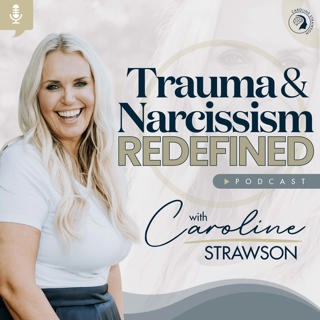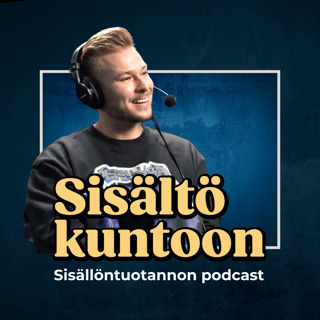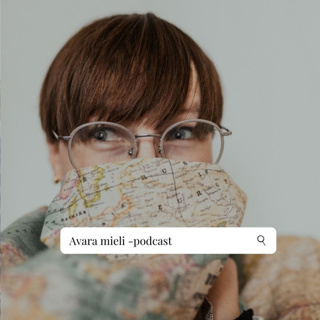
Is Depression a Symptom of Narcissistic Abuse?
In this episode, we will talk about depression and narcissistic abuse. Although there is some controversy around whether narcissistic abuse causes depression or not, once depression is identified in the victims of narcissistic abuse, that is not really relevant from a trauma-informed perspective. The focus should be on the origin of that depression and on the protector parts that show up. Today, I'll be sharing my experiences with depression during my marriage with my ex-husband, how I identified depression as a protector part for me and what it was trying to protect me from. What You Will Learn In This Episode: - How being diagnosed with postnatal depression affected me and the way I saw myself - What role my own stories of not feeling good enough had in my decision to stay in an abusive relationship - Why I now know that depression was acting as a protector part - The importance of getting curious about the origin of our protector parts In my case, it wasn't that my ex-husband abuse was making me feel depressed. The core wound that stepped up for me, my "depression protector part", was protecting me from what my system considered the bigger danger at the time. So my invitation for you is, instead of trying to minimise depression symptoms, to get curious about its origin and its root cause. Resources: - Episode 079 15 Gaslighting Terms A Narcissist Will Use https://podcasts.apple.com/gb/podcast/079-15-gaslighting-terms-a-narcissist-will-use/id1527479270 - Join my Narcissistic Trauma Recovery Programme™ https://go.carolinestrawson.com/heal-the-trauma-of-narcissistic-abuse - Join my Facebook group at https://www.facebook.com/groups/thriveafternarcissisticabuse - Connect with me on Instagram: https://www.instagram.com/carolinestrawson/ - My website: https://www.carolinestrawson.com/
18 Tammi 202222min

15 Gaslighting Terms A Narcissist Will Use
When we are in a narcissistic abusive relationship, we hear certain phrases so often that we normalise hearing them, but they actually erode our mental health. The narcissist is gaslighting us. In this episode, we will go through 15 gaslighting phrases I heard during my marriage with a covert narcissist. We will explore the devastating effects these phrases have on our confidence, mental health and on our self-worth. What You Will Learn In This Episode: - Why gaslighting is a form of abuse, and what effects it can have on our mental health - The gaslighting phrases that can make us doubt our own sanity - Why most narcissists use these gaslighting phrases to protect themselves - What we can do to prevent being gaslighted by narcissist abusers Hearing any of these 15 phrases and their variations regularly in our relationship is a huge red flag, and it should be enough to make us curious about it. The first step is to seek help, whether from a professional, a counsellor or even an online group, and then understand that we are doing what we can with the tools we have, from the programming we had from birth. We should never forget that being in an abusive relationship is not our fault; we are in it for a reason. Once we understand that reason, we can start working on it and fix it. Resources: - Join my Narcissistic Trauma Recovery Programme™ https://go.carolinestrawson.com/heal-the-trauma-of-narcissistic-abuse - Join my Facebook group at https://www.facebook.com/groups/thriveafternarcissisticabuse - Connect with me on Instagram: https://www.instagram.com/carolinestrawson/ - My website: https://www.carolinestrawson.com/
11 Tammi 202217min

12 Signs You Are Dating a Narcissist
Something I get asked a lot on social media is, how do I know if I'm dating a narcissist again? The decision to start dating again after a separation is personal and it doesn't have a specific time to occur. However, after suffering narcissistic abuse, whether we are looking for Mr or Mrs Right, or Mr or Mrs Right Now, one thing is sure: we want to avoid dating a narcissist. In this episode, we will go through the 12 signs you should pay attention to to know if you are dating a narcissist. What You Will Learn In This Episode: - Beware of love bombing at the beginning of the relationship - What a strong entitlement attitude is really telling us - The things we can easily spot during a casual conversation about how narcissists talk and what they talk about - Being alert to manipulative attitudes and the consequences of not following their plans - What we can read from a strong lack of commitment and a constant tendency to break the rules - Why narcissists put others down all the time, why they are master gaslighters, and why they don't have long-term friendships It usually takes some time, at least six or seven dates, to spot a narcissist. However, we can have our eyes and ears open to these 12 signs, be aware of them and see if any of them rarely appears, appears often, or almost all the time. We must be patient and we don't need to go full-blown from the very beginning. If we've found the right person and the relationship is meant to be, then time is not really an issue. Resources: - Join my Narcissistic Trauma Recovery Programme™ https://go.carolinestrawson.com/heal-the-trauma-of-narcissistic-abuse - Join my Facebook group at https://www.facebook.com/groups/thriveafternarcissisticabuse - Connect with me on Instagram: https://www.instagram.com/carolinestrawson/ - My website: https://www.carolinestrawson.com/
4 Tammi 202217min

Narcissistic Abuse & Emotional Eating
One of the most challenging things I had to deal with during my relationship with my ex-husband was emotional eating. I'll share with you the situations that triggered my emotional eating protector parts, the effects that had on my self-image, self-esteem and mental health. We will also talk about why our body chooses emotional eating to protect us and how to deal with it. What You Will Learn In This Episode: - What exactly triggered my emotional eating protector parts - What my emotional eating was protecting me from - Why emotional eating is so effective as a pain release mechanism - What is emotional eating distracting us from, and why we must get curious about it Once we start recognising we are not our protector parts, that we are blended into them and that they are there to distract us from feeling pain, we'll start seeing things differently. It will be easier to lift the shame and guilt that trigger our emotional eating protector parts. Then we can get curious about why we feel that guilt or shame and work on those issues. Resources: - Join my Narcissistic Trauma Recovery Programme™ https://go.carolinestrawson.com/heal-the-trauma-of-narcissistic-abuse - Join my Facebook group at https://www.facebook.com/groups/thriveafternarcissisticabuse - Connect with me on Instagram: https://www.instagram.com/carolinestrawson/ - My website: https://www.carolinestrawson.com/
28 Joulu 202118min

Can You Co-Parent with a Narcissist?
We hear pretty often that co-parenting is the best thing we can do for our children. However, those coming from an abusive relationship might find it almost impossible to be friendly with their abuser. In today's episode, we will talk about co-parenting with a narcissist, the challenges we'll find there and why it can be so triggering, and we’ll also explore an alternative to co-parenting - parallel parenting. What You Will Learn In This Episode: - Why co-parenting is not always a better choice for our family situation - What the communication challenges are that make co-parenting so hard - What parallel parenting is and how to do it properly - Some of the mistakes I made in co-parenting that you can avoid - Why parallel parenting is so effective in helping us keep our sanity We need to stop punishing ourselves for not being able to co-parent with the narcissist. We are not less of a parent if we can't co-parent. We've been in an abusive relationship and our focus must be on getting better, not on making sure the abuser is feeling better. The best thing we can give our kids is a mentally stable parent, and that’s where parallel parenting can help us. Resources: - Our Family Wizard website: https://www.ourfamilywizard.com/ - Join my Narcissistic Trauma Recovery Programme™ https://go.carolinestrawson.com/heal-the-trauma-of-narcissistic-abuse - Join my Facebook group at https://www.facebook.com/groups/thriveafternarcissisticabuse - Connect with me on Instagram: https://www.instagram.com/carolinestrawson/ - My website: https://www.carolinestrawson.com/
21 Joulu 202117min

Holiday Times & Christmas with the Narcissist
As Christmas is getting closer, I want to talk about how to deal with a narcissist during not only this holiday, but any other type of celebration, such as birthdays or other family events. We'll explore two different scenarios, one for those separated or divorced from a narcissist, and the other for those who have to spend the holidays with a narcissist. I'll also share tips on communicating and planning these events to reduce conflict to the minimum, and how and when to respond to the narcissist's messages. What You Will Learn In This Episode: - Why is it so challenging to celebrate any holiday in peace with a narcissist - What I've learned from my experience with my narcissist ex-husband during the holidays - The advantages of planning ahead for these events, and how it can help us in court if we need it - How to structure our messages when communicating our plans with our narcissist ex-spouse - How to approach communication when we must spend the holidays with a narcissist We have an advantage when it comes to any holiday - we know precisely when they will happen. This allows us to plan, minimise and mitigate the conflict by creating the best-case scenario for our kids and us. Still, conflicts can appear, even if we plan ahead and do our best to avoid them. We must remember to stay in our lane, treat ourselves with kindness and avoid self-judgement if that happens. Resources: - Join my Narcissistic Trauma Recovery Programme™ https://go.carolinestrawson.com/heal-the-trauma-of-narcissistic-abuse - Join my Facebook group at https://www.facebook.com/groups/thriveafternarcissisticabuse - Connect with me on Instagram: https://www.instagram.com/carolinestrawson/ - My website: https://www.carolinestrawson.com/
14 Joulu 202118min

When Your Friends & Family Tell You To Ignore The Narcissist
Today I want to talk about something I went through when I was suffering narcissistic abuse, which is when your family and friends tell you to ignore the narcissist. As always, we’ll look at this from a trauma-informed lens. First, we’ll understand what is so triggering about receiving this kind of comments from our loved ones, and then what we can do to stop being triggered and avoid getting into unnecessary conflicts. What You Will Learn In This Episode: - Why the phrase "just ignore them" triggers us so much - How hearing that from our loved ones makes us feel the need for validation - What kind of addiction narcissistic abuse creates - Why we must not feel shame or guilt for firing messages back at the narcissist We must recognise that healing from narcissistic abuse is not just doing affirmations and repeating "I'm good enough" every day. We have to perform deep work in our bodies because traumatic experiences are stored there. They get locked in our bodies and go directly into our fascia, deep into the visceral level and into our nervous system. Resources: - Join my Narcissistic Trauma Recovery Programme™ https://go.carolinestrawson.com/heal-the-trauma-of-narcissistic-abuse - Join my Facebook group at https://www.facebook.com/groups/thriveafternarcissisticabuse - Connect with me on Instagram: https://www.instagram.com/carolinestrawson/ - My website: https://www.carolinestrawson.com/
7 Joulu 202118min

Why Does a Narcissist Lie?
For those of us who have been victimised by a narcissist, knowing they are spreading lies about us can be really triggering. It might become worse when we see people around them believing their lies and turning into what we call flying monkeys. So in this episode, we'll unravel why narcissists feel this need to spread lies about us, why it triggers a response from us and what we can do to stop reacting to their lies. What You Will Learn In This Episode: - Why narcissists continually, habitually and pathologically choose to lie - The link between the narcissist’s protector parts and their need to lie about us - If the trigger and the activation don't come from the lie per se, where they actually come from - How we can protect ourselves from being triggered by a narcissist's lies about us I used to suffer a lot because of my ex-husband's lies. I wasted tons of energy on two things I would never control - what he would say about me and what people would think when they heard that. Once I realised that, I started focusing and getting curious about what I had control over - my reaction to the lies and what protector part triggered my response. Resources: - Join my Narcissistic Trauma Recovery Programme™ https://go.carolinestrawson.com/heal-the-trauma-of-narcissistic-abuse - Join my Facebook group at https://www.facebook.com/groups/thriveafternarcissisticabuse - Connect with me on Instagram: https://www.instagram.com/carolinestrawson/ - My website: https://www.carolinestrawson.com/
30 Marras 202120min






















